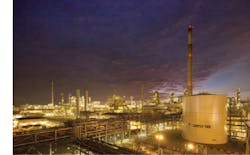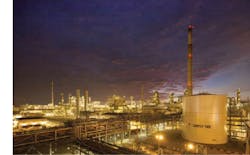Thailand's PTTGC takes FID, lets contract for olefins plant at Map Ta Phut
Robert Brelsford
Downstream Technology Editor
PTT Global Chemical Public Co. Ltd. (PTTGC) has approved a $985-million project to build an olefins plant as part of an expansion of its existing operations at Map Ta Phut Industrial Estate in Thailand's Rayong Province about 150 km southeast of Bangkok.
The Map Ta Phut Retrofit (MTPR) Olefins Reconfiguration project aims to increase feedstock flexibility, increase production at the site, and reduce reliance on natural gas from the Gulf of Thailand by increasing use of the operator's internal naphtha and LPG feedstock from refining and aromatics units or, alternatively, enabling imports of less-expensive feedstock from abroad.
As a start, PTTGC has let a contract to Samsung Engineering Co. Ltd., Seoul, to help in the expansion project. Alongside local Thai partner TTCL PCL, Samsung Engineering will deliver engineering, procurement, and construction of an olefins plant able to produce 500,000 tonnes/year of ethylene and 250,000 tpy of propylene from a main feedstock of naphtha and LPG, increasing the company's overall olefins nameplate capacity to 3.738 million tpy from 2.988 million tpy, PTTGC said in a Jan. 23 filing to the Stock Exchange of Thailand.
Samsung Engineering's share of the 880 billion-won EPC contract is valued at 670 billion won, the company said.
The plant is slated to begin commercial operation sometime in 2020.
PTT Global Chemical will build an olefins plant at its Map Ta Phut Industrial Estate in Thailand. Photo from PTTGC.
Alongside receiving approval of the project's environmental health impact assessment from Thailand's Office of Natural Resources and Environmental Policy and Planning, PTTGC's proposed plant also has been granted a factory expansion permit by the Industrial Estate Authority of Thailand, the operator said.
In addition to its existing olefins capacity at Map Ta Phut, PTTGC also operates 145,000 b/d of crude distillation capacity, 135,000 b/d of condensate distillation capacity, and 2.419 million tpy of aromatics capacity at the integrated location.

